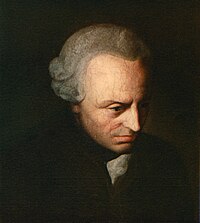This article may be a rough translation from German. It may have been generated, in whole or in part, by a computer or by a translator without dual proficiency. (November 2023) |
| Part of a series on |
| Immanuel Kant |
|---|
 |
|
Category • |
In Kantian philosophy, the thing-in-itself (German: Ding an sich) is the status of objects as they are, independent of representation and observation. The concept of the thing-in-itself was introduced by the German philosopher Immanuel Kant, and over the following centuries was met with controversy among later philosophers.[1] It is closely related to Kant's concept of noumena or the objects of inquiry, as opposed to phenomena, its manifestations.
- ^ "Salomon Maimon". Salomon Maimon (Stanford Encyclopedia of Philosophy). Metaphysics Research Lab, Stanford University. 2021.
Perhaps the most obvious problem — and certainly one of the earliest — that Kant faces concerns the issue of the thing in itself.